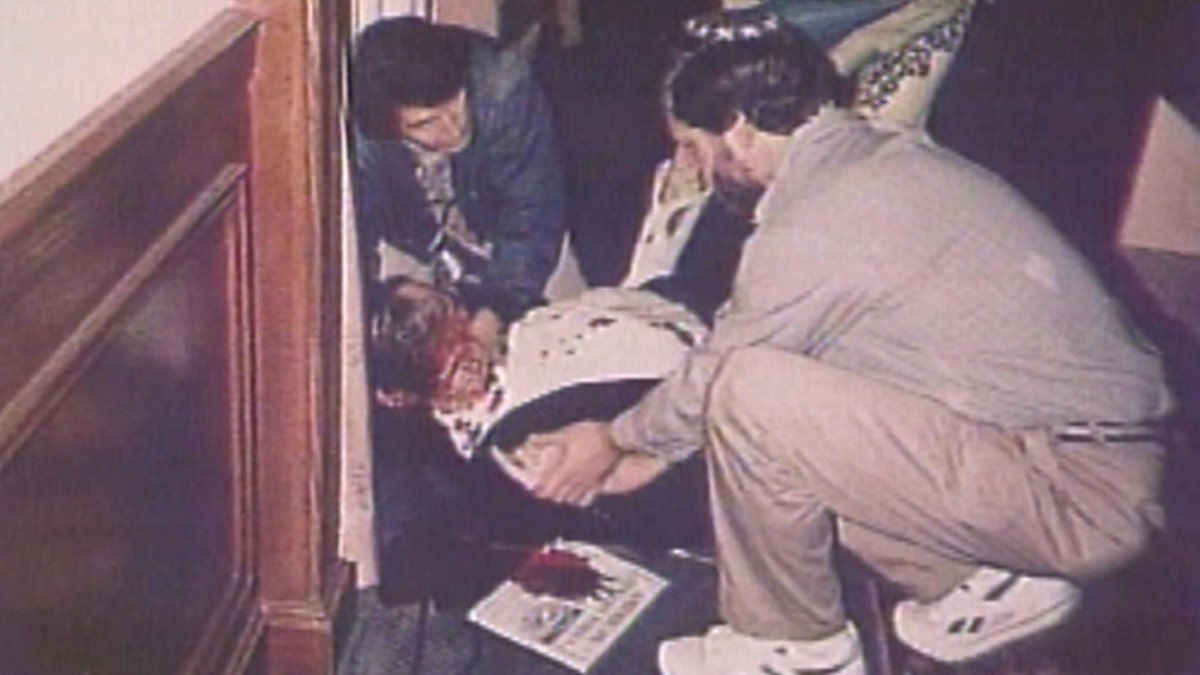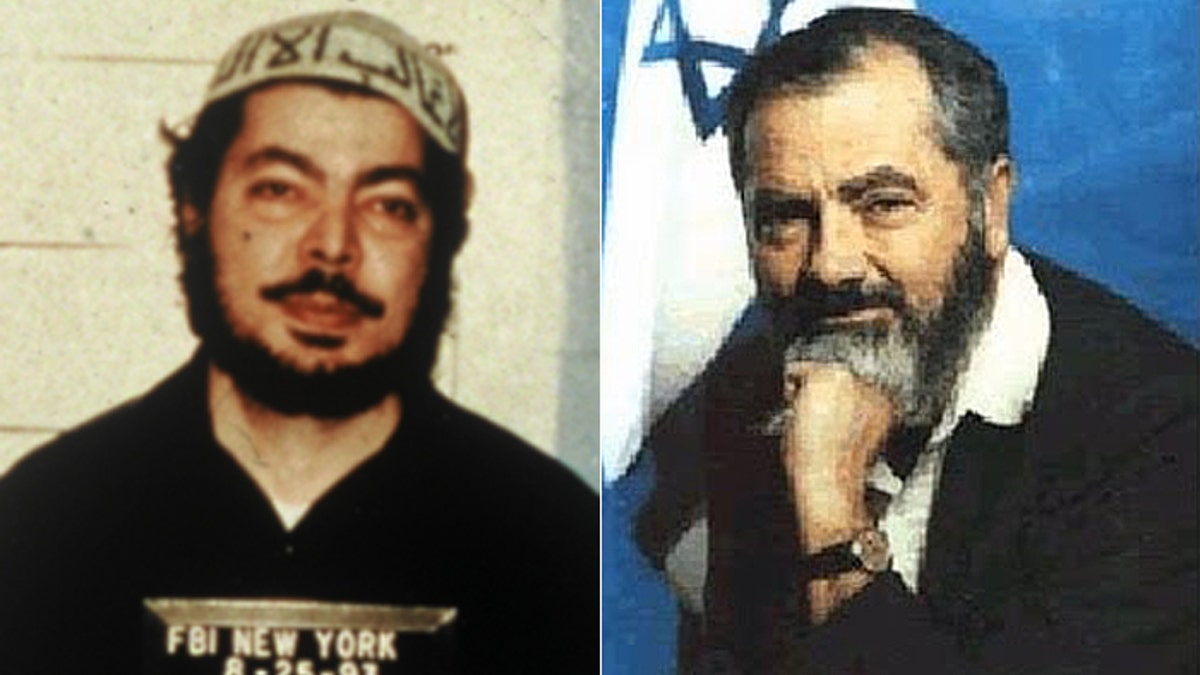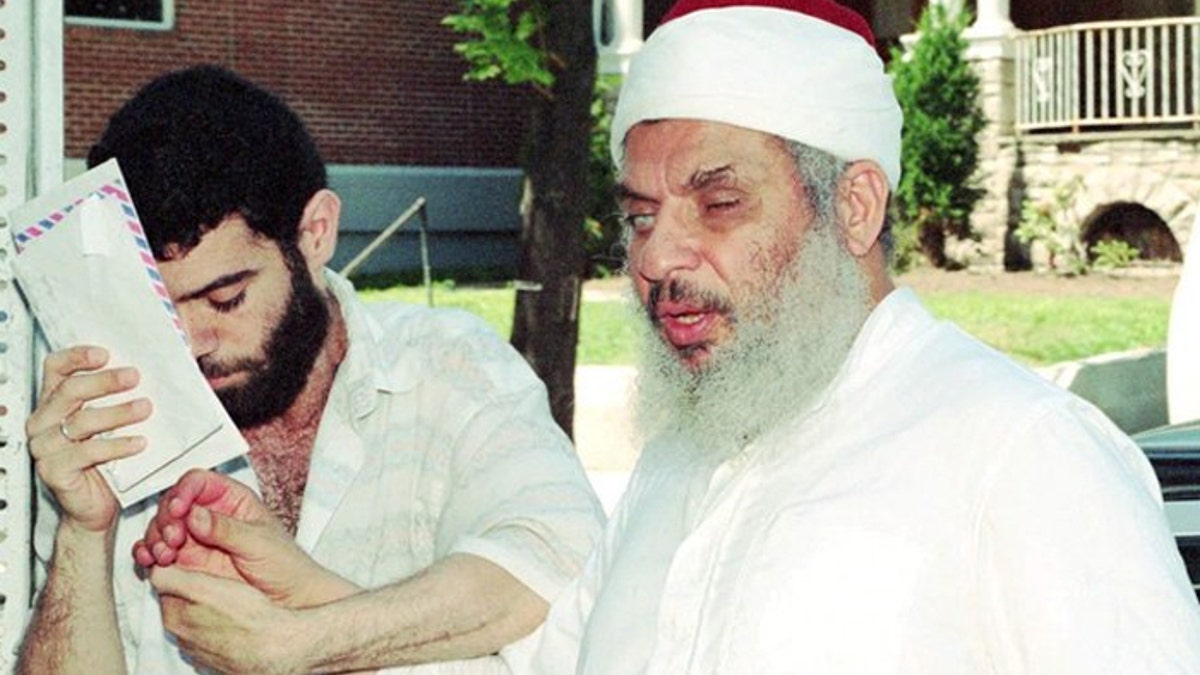
The fallen firebrand was an outspoken advocate of Israel, and a target of jihadists.
This day marks the first jihad terrorist attack on American soil.
Eleven years before Al Qaeda flew airliners into the World Trade Center and the Pentagon on 9/11, 23 years before the pressure cooker bombs exploded at the Boston Marathon and long before the nation was ever aware of the dangers of radical Islamic terrorism, the first strike inside the U.S. opened with the deadly pull of a trigger in a meeting room of a Manhattan hotel.
"I heard the sound of a cannon -- one shot, and all of a sudden there was a second shot and I feared the worst," recalled Shannon Taylor, who remembers it vividly.
"The 1990 Kahane murder was clearly the first strike in the United States by the Sunni jihadist terror network that eventually evolved into global Al Qaeda."
It was Nov. 5, 1990. Extremist Rabbi Meir Kahane was giving a speech in the Marriott hotel on Lexington Ave. and 49th St. in Manhattan. Taylor was standing just feet from him.
Kahane had long been a controversial Jewish activist and firebrand. Born in Brooklyn, he went on to found the Jewish Defense League and served four years as a member of the Israeli Knesset before being barred from running for re-election for his views espousing the expulsion of Arabs from Israel. He also served a one-year prison term in 1975 in New York for violating his probation stemming from a plot to make bombs.
But on that night 25 years ago, after speaking to a group in the hotel conference room, he was shot point-blank by an Egyptian-born man who worked in the New York City Criminal Court system as an air-conditioning repairman, 36-year-old El Sayyid Nosair.

Nosair, (l.), claims to have renounced terrorism. Kahane, (r.), still has a following in Israel.
"The 1990 Kahane murder was clearly the first strike in the United States by the Sunni jihadist terror network that eventually evolved into global Al Qaeda," said Andrew McCarthy, the former federal prosecutor who went on to try Nosair and others on terrorism charges and wrote the book "Willful Blindness, Memoir of the Jihad," about the cases and the connection to a much larger conspiracy.
"It was probably not recognized as such because the target was not distinctly American," noted McCarthy.
"Rabbi Kahane was the founder of the JDL. Because we were unfamiliar with Islamic-supremacist ideology, we would not have comprehended at the time that jihadists regard America, Israel and the West as one and the same -- the enemy."

Blind Sheikh Omar Abdel Rahman led a terror cell that had ties to Nosair, according to McCarthy. (Associated Press)
At the time, the New York City police and local prosecutors declared that Nosair "was acting alone."
But Taylor, one of Kahane's lawyers and a photographer who documented the shooting, never had any doubt that the assassination was part of a broader plot by a terrorist that targeted the United States. He said he warned law enforcement and local prosecutors that the killing had all the earmarks of a long planned, wider terrorist conspiracy, that he says they refused to acknowledge at the time.
And as Taylor predicted, it turned out that Nosair was anything but a lone gunman.
He was tried as the sole defendant in New York State court and acquitted of the murder in 1991.
But in the wake of the bombing of the World Trade Center two years later in 1993, federal authorities, with McCarthy as the Assistant United States Attorney, began to investigate and were able to uncover the truth. It was discovered that Nosair was indeed part of a New York and New Jersey-based terrorist cell, headed by the blind Sheik Omar Abdel-Rahman, that had existed for years without detection.
Nosair, along with Abdel-Rahman and other followers, was eventually convicted of conspiracy in the first World Trade Center attack that killed six people and injured more than 1,000, as well as the plot to bomb New York City landmarks in 1995. Nosair was also given a life sentence for the Kahane killing, convicted of a host of federal charges including murder in aid of racketeering and the use of a firearm in the commission of murder.
But the unraveling of a wider plot, and the existence of a network of jihadi terrorists here on our soil, was a remote concept in the first years after Kahane's assassination, until McCarthy tried the bombing case.
"The killing was also the first big indicator of the willful blindness that still burdens our interaction with radical Islam," McCarthy said. "The New York State investigators went out of their way not to acknowledge that Nosair was a member of a jihadist network --- something that would have been obvious to anyone who did a competent analysis of the seizures from his home, work locker, and abandoned get-away car. The day after the shooting, before any real investigation could have been done, the NYPD chief of detectives pronounced that the murder was the work of a lone, crazed gunman."
"If the proper attention had been paid, and the writings of Nosair had been read and analyzed, I think you would have prevented the first attack on the World Trade Center and possibly the second," insisted Taylor.
"It was their test of fire," he said of Rahman and his followers. "They had nothing but contempt for American law and American law enforcement and it served as their rallying cry. It took years for authorities to acknowledge that this was a terrorist act. It was all the same thinking. Not enough was done until the attack on the World Trade Center, and as a result of a miscarriage of justice, we have nothing but wars, chaos and endless cost in lives and resources due to unchecked terrorism."
McCarthy said the evidence was there, but was ignored.
"The World Trade Center was bombed about 27 months after the homicide. It turned out that between the Kahane murder and some surveillance the FBI had done in 1989, the authorities already had evidence tying Nosair to the major World Trade Center bombers, as well as other major conspirators. But they did not put that evidence together and did not recognize the threat of radical Islam that was before their eyes."
Today, Nosair is said to condemn jihad.
In 2013, Los Angeles Times correspondent Robert Serrano reported that Nosair claims, "Young men are throwing their lives away, killing innocents...the families of the jihadists suffer for years."
But Nosair, wrote Serrano, said that Kahane's killing "was justified because the rabbi had called for war against Muslims. Kahane...openly advocated genocide and ethnic cleansing."
Nosair's son is not so sure that his father has really changed.
"My father was the first known Islamic jihadist to take a life on American soil. He worked with the support of a terror cell overseas that would ultimately call itself Al Qaeda," wrote 32 year old Zak Ebrahim. His book, published last year, "The Terrorist's Son, A Story of Choice," is about his upbringing. He says he has neither seen nor spoken to his father in years.
"Kahane's assassination was not just hateful, but a failure as anything other than simple murder," Ebrahim wrote.
"My father intended to shut the rabbi up and bring glory unto Allah. What he actually did was to bring shame and suspicion onto all Muslims, and to inspire more pointless and cowardly acts of violence."
He acknowledges that when his father, alone, was first convicted of a gun charge in 1990, "the NYPD can't fathom the concept of a global terror cell --- virtually no one can --- and they have no interest in trying to prosecute one."
He also wrote that after his father went to prison on the gun charge from the Kahane case in 1991, "he is fantasizing about bringing down the Twin Towers."
After 9/11, he says his father "must have regarded the destruction of the Twin Towers as a great victory for Islam -- maybe even as the cumulating of the work he and the Blind Sheikh and Ramzi Yousef began years earlier with the Ryder truck," a reference to the explosive-packed van driven into the building's garage eight years earlier.
And the legacy of violence has also continued.
One of Kahane's sons, 34 year old Binyamin, was shot to death by Palestinian gunmen as he was driving with five of his children from Jerusalem to the West Bank on Dec. 31, 2000. His wife, 31-year-old Talya, was also killed.
Last month it was reported that one of Kahane's grandsons, 23-year-old activist Meir Ettinger, went on a hunger strike in Israel after authorities placed him on six-month administrative detention. He has been accused of "organizing extremist Jewish activities" in the settlements, though his lawyer denies that Ettinger has been involved in any violence and claims he is being prosecuted for his blog writings.
And the fears of more possible terrorist attacks here at home, echoes of the Kahane shooting, are now a part of our lives.
"The legacy of the homicide should alarm us. It showed that there is an active, ideologically-inspired terrorist threat that plots, recruits and raises funds within mosques and Islamic community centers," warned McCarthy. "Islamists and their sympathizers working outside and inside of government have sullied pro-active policing that is essential to gathering intelligence and identifying potential threats before they become active plots. That is why, increasingly, we are just as vulnerable today as we were before the attacks of the '90s that led to 9/11," he says.
"It all started with those shots on that night," added Taylor. "It was the tunnel vision, cover-up and inadequate response that has given us the consequences that we suffer from today."
Follow Eric Shawn on Twitter: @EricShawnonFox









































